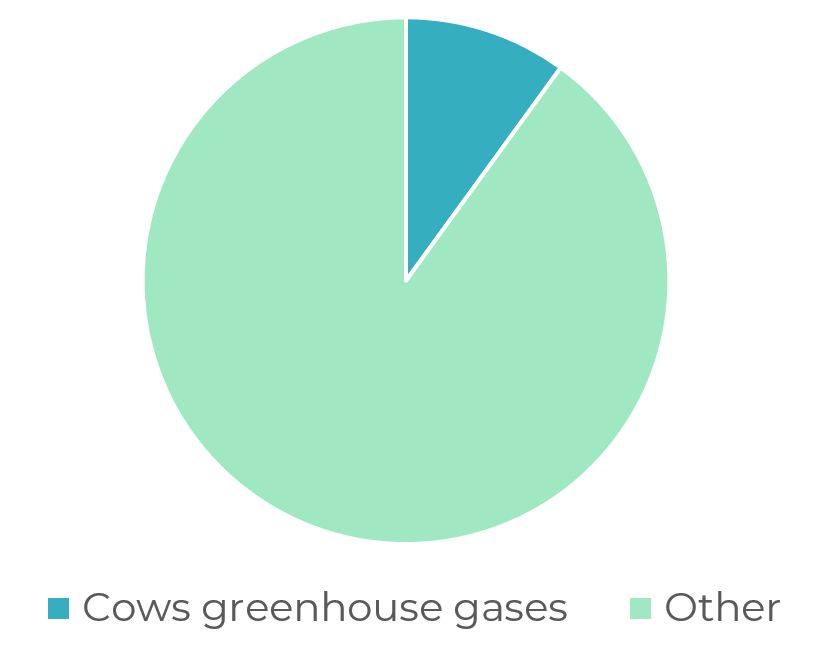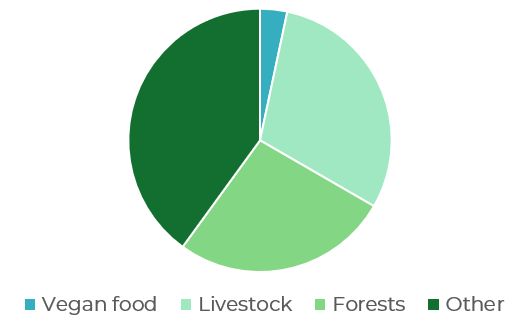There are many interesting facts about climate change and biodiversity loss and there are a lot of solutions how to stop these crises. Help us to speak more about these topics and spread the message via social and classic media!
Did you know that just 3% of all mammals are wild animals?

Keeping cattle is not bad everywhere. Many extensively used pastures are in harmony with nature and biodiversity, and cattle pastures often prevent desertification, for example on many alpine pastures or other regions of the world. So-called holistic management according to Allan Savory can even be used to reverse desertification through faulty, uncontrolled cattle grazing.

A cattle emits 4 tons of CO2 equivalents of methane per year, which makes a total of around 6 billion tons worldwide. More than 10% of all harmful greenhouse gases can therefore be traced back to cows. In addition to the mentioned partially positive effects on nature, we have more areas overall due to the enormous number of cattle, which have a destructive effect on the climate and biodiversity. Many meadows and pastures are over-fertilized, too often worked with heavy machinery or have generally only emerged from the destruction of natural ecosystems (rainforest deforestation, draining of moors, etc.).

Conclusion: It is not natural that there are so many farm animals, especially cows, of course. It is the main reason for the destruction of diverse habitats and ultimately the main reason for the sixth mass extinction of species and the displacement of the wild. It brings our earth out of balance, a solution to this problem can only be a rethink and a global turnaround towards a more plant-based diet.

Did you know that 1/3 of the worldwide land usage is for producing animal products?
Let us now come to a few crucial facts: Around the world, around 4.5 billion hectares are used for the production of animal products. More than 1 billion hectares are arable land for animal feed. Other sources calculate the worldwide area for feed for livestock with approx. 500 million hectares. The rest of the food does not even need 400 million hectares of cultivation area.
Studies by Global2000 show that a vegan needs around 400 square meters per year, a vegetarian 600 and a meat eater 3200. If everyone on the planet were to have a vegetarian diet, we would theoretically have 450 million hectares (7.6 billion people times 600 square meters) for food production. That would be about 10 times as little as is currently the case. However, whether this is possible due to the nutrient cycle and whether a vegetarian or vegan lifestyle would make sense for everyone is controversial. That’s why we’re not going to discuss or demand that here.
Conclusion: However, it is undisputed that we consume far too much meat and generally too many animal products around the world. For WHO, a worldwide reduction to a third or less of the amount currently produced would be sufficient and at the same time bring many health benefits! With a third of today’s consumption, billions of hectares of land would be given back to nature and, at the same time, we would be able to combat climate change and the extinction of species.

Did you know that we can feed 80 billion livestock animals but not 8 billion people?
Did you know that because of the albedo effect planting trees is not useful everywhere?
Did you know that there are trees growing that fast that you can harvest them after 10 years and use them as building material for a lot of products?
Did you know that Europe half of the forest area in Europe was destroyed during the last 3000 years?
Did you know that the rain forest is not the lung of the earth?
Did you know that we just need to plant 0.6 per cent of the land for livestock to compensate all annual flight emissions?
Did you know that agriculture is responsible for about 15 percent of the greenhouse gas emissions? But why don’t we speak more about how much land is used? And how many trees could be planted there to compensate 100% of the emitted CO2.
| Cookie | Dauer | Beschreibung |
|---|---|---|
| cookielawinfo-checkbox-analytics | 11 months | This cookie is set by GDPR Cookie Consent plugin. The cookie is used to store the user consent for the cookies in the category "Analytics". |
| cookielawinfo-checkbox-functional | 11 months | The cookie is set by GDPR cookie consent to record the user consent for the cookies in the category "Functional". |
| cookielawinfo-checkbox-necessary | 11 months | This cookie is set by GDPR Cookie Consent plugin. The cookies is used to store the user consent for the cookies in the category "Necessary". |
| cookielawinfo-checkbox-others | 11 months | This cookie is set by GDPR Cookie Consent plugin. The cookie is used to store the user consent for the cookies in the category "Other. |
| cookielawinfo-checkbox-performance | 11 months | This cookie is set by GDPR Cookie Consent plugin. The cookie is used to store the user consent for the cookies in the category "Performance". |
| viewed_cookie_policy | 11 months | The cookie is set by the GDPR Cookie Consent plugin and is used to store whether or not user has consented to the use of cookies. It does not store any personal data. |